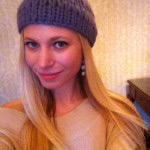Have you ever fallen so deeply in love with a book and its protagonists that, when you turned the last page and finished the story, you didn’t feel a sense of closure or satisfaction, but instead were filled with anxiety about what happens next for the character that resonates so deeply with you? It’s a horrible feeling, especially if you’ve reached the end of the series or story. If you’re lucky, you get an epilogue a là Harry Potter’s “All was well” but, more often than not, the author stays mum on the subject and you have to resign yourself to a lifetime of unanswered questions about your favorite literary characters.
If you’re luckier, though, you’ll stumble across someone like author and artist Carolyn Parkhurst, who will answer those questions for one of those childhood heroines you thought you’d never hear from again, and also showcase her in a completely novel and compelling light. This is exactly what she did for Eloise, the Plaza Hotel’s most precocious resident and protagonist of the Eloise series, in a satirical piece for The New Yorker titled Eloise: An Update. And while all is arguably not well for the grown-up version of everyone’s favorite little lady (wings and sliders with a big side of ennui is one of her permanent room service orders), all is definitely well-written, the kind of well-written where you crack a smile at the first sentence you read and keep it on your face the entire piece through.
We were able to chat with Carolyn Parkhurst about her creative process, how she balances her artistic sensibilities and her responsibilities as a mother of two children, and what inspires her, off the page and on.
Can you tell us about the origin of Eloise: An Update and how it came to fruition?
Yes, of course. Because it’s a humor piece, and a satire, I’m not sure if it comes through, but I’m actually a big fan of the Eloise books by Kay Thompson. I have two kids, and Eloise was one of the books I was most excited to introduce them to. But one day, it occurred to me how funny and odd it would be if grown-up Eloise were still living in a hotel and creating all sorts of chaos with her crazy antics. And the beginning came to me, unbidden: “I am Eloise. I am forty-six.”
It’s a short piece (about 1000 words), but it actually took me a couple of months to write the piece, because I had other projects I was working on, and because I didn’t want to force the humor. But I kept rereading the original Eloise, studying the tone and thinking about how Eloise’s charming antics might be translated to a slightly strange adult subject.
Writing for The New Yorker is a literary coup. How did you start writing for them?
This is the first piece I’ve had published by The New Yorker. I submitted it through my agent—it was maybe the second or third time I’d submitted a humor piece to them—and they accepted it. It’s been a huge thrill, but it also feels a lot like winning the lottery: I wouldn’t be able to tell anyone else how to do it, and I don’t know whether it’s something I’ll ever achieve again or not.
You’ve published three novels and a children’s book — can you briefly tell us about your writing process? Do you have a routine? Do you always outline your stories first?
I actually never outline, although I sometimes wish I could; it would be helpful to have a better idea of where I’m heading. But aside from one or two plot points that I know I’m heading toward, I pretty much have to figure the rest out through writing it. Each of my novels has begun to take shape when an idea intersects with a voice. For example, my most recent novel, The Nobodies Album, was inspired by a radio piece I heard about a writer who’d decided to revise a story that she’d written (and published) more than thirty years before. The idea made me uncomfortable (isn’t there any time when a piece is actually finished?) and I began to wonder: What would happen if a writer decided to revise the ending of all her published books? But it wasn’t until I figured out the first sentence in the narrator’s voice—There are some stories no one wants to hear—that I really had something to work with.
Because I have two school-age kids, my routine is somewhat dependent on their schedules. Ideally, I get at least two-three hours each weekday to spend on my work. The hardest part is getting myself into the right head-space to make that time count, rather than letting it fill up with answering emails, wasting time reading random stuff online, etc. I have a couple of programs that allow me to turn off the Internet, and that helps a lot. It’s also helpful to give myself a concrete goal—I’ll write this many words today, or this many pages. I’m a great procrastinator, but I’ve learned through experience that I always feel better at the end of the day if I’ve done some actual work. And that the only cure for writing-related panic is writing itself.
What is the biggest difference you’ve found in writing a children’s book vs. a novel, other than length?
Probably that a children’s book needs to be focused on one discrete story, a single moment in the lives of your characters. It’s like a snapshot—of a day or an adventure—whereas a novel is more of a journey. In a novel, there’s a lot more space for rambling and exploring. You can approach your subject-matter in a more roundabout way.
I actually didn’t think I’d ever write a children’s book. My book Cooking with Henry and Elliebelly, is about two kids (ages 5 and 2), who are pretending to host a cooking show, and it’s based on a game that my kids used to play together when they were younger. Although I shaped the idea into a story and put it into words, it’s not something I ever would have thought of on my own. What made it authentic was that it had its origin in the way real-life children play and interact.
Do you have a favorite piece you’ve ever written?
That’s a tough question to answer; like a lot of writers, I alternate wildly between being really proud of my work (and sometimes over-estimating how good it is) and deciding that it’s actually all crap, and that I’ve never written a worthwhile word in my life.
But for this moment, on this day, my answer is this: a short story that I wrote called “Care and Feeding,” which was included in the Washington Post’s holiday fiction issue a couple of years ago. It’s about the unique challenges of having a child born with wings, and it’s available here.
What kinds of stories are you passionate about as a storyteller?
I like to explore characters whose motivations I don’t entirely understand. What would make a teenage girl hide a pregnancy from everyone around her? What would make an otherwise reasonable man try to teach his dog to talk? What would make an author decide to revisit and change all of her earlier work? I want to understand—and to convey to the reader—what it’s like to live these people’s lives at their highest and lowest points. I’m interested in mysteries and secrets, both the ones we keep from other people and the ones we keep from ourselves. I’m interested in the question of how well we can ever truly know another person—and how fully we, ourselves, can be known—and I’m interested in the way our lives may be shaped by the tiniest moments. I like to find characters whose actions may seem questionable at best, and I like to uncover why they’re worthy of our compassion.
What do you think is your biggest accomplishment to date?
I always freak out a little bit when I get big-picture questions like this. I mean, do my children count as an accomplishment? Not really, since they’re their own person, and since they’re very much still works-in-progress. But if I say that my biggest accomplishment is making the New York Times bestseller list (or, for that matter, having a piece in The New Yorker), and I don’t mention my children, then what kind of person do I look like???
Okay. Deep breath. It was, indeed, a very big deal to make the NYT list, but it’s the kind of thing you can’t focus on too much or you get kind of weird about it. (I once described it as being “like a really good day spa, if day spas also made you insecure and kind of egotistical.”) Really, I’m more about the little accomplishments. Like I once met a woman who had a quote from The Dogs of Babel tattooed on her back. And a few days ago, I walked into a library I don’t often go to, and they had my book Lost and Found sitting on the Staff Recommendations shelf. Finishing a book is a big accomplishment, and getting the fresh new copies in the mail, holding the actual book in your hands, is a feeling that’s hard to beat. But none of those things can happen without this most basic achievement: a day of writing, a handful of sentences on a page. Sometimes it’s important to keep your eyes on the small stuff.
You’ve mentioned you’re a mother — have you found it difficult to find time to allow yourself to be creative? I know that when I am done with four loads of laundry and cleaning my kitchen floors sometimes my brain isn’t in the most imaginative or productive place.
Yes, definitely. I don’t work well at home, for that very reason: emptying the dishwasher never seems as appealing as it does when I’m avoiding getting to work. For a long time I wrote in coffee shops (which was fine except that I felt like I had to keep buying more food and coffee to justify my use of a table), and then for a while, I rented an office, which eventually became too high an expense.
The place where I work now is a shared writing space: you pay a certain amount every month, and it gives you the right to show up whenever you want and claim a cubicle. It works out really well; you have quiet and space when you need it, as well as the social aspect of meeting other writers who are taking a few minutes out to have lunch or make a cup of coffee.
Do you find it difficult to balance your personal and professional life?
In some ways, yes. I write under my maiden name and use my married name for most of my day-to-day activities, so when I meet someone new, there’s always a second of figuring out how to introduce myself. But things like that aren’t such a big deal.
One of the issues I find myself thinking about a lot is the thorny question of whether it’s okay to use material inspired by my own life, including the experiences I’ve had with my husband and children. Because I write fiction, there’s always a layer of distance: I can always say, “Well of course it’s not true, because I’m not a middle-aged male linguistics professor [as the narrator of my first novel The Dogs of Babel is],” or whatever. But of course some of my work ends up being autobiographical; I’ve only got a single life to draw from, and if I write about what it’s like to be a mother (or what it’s like to fall in love or to suffer from depression or to be hurt by a friend), then of course I’m going to be drawing on my own experiences in those areas.
This is actually something I wrote about in my novel The Nobodies Album, in which the narrator is a writer. She says that “the life experience of a fiction writer is like butter in cookie dough: it’s a crucial part of flavor and texture—you certainly couldn’t leave it out—but if you’ve done it right, it can’t be discerned as a separate element.”
Truthfully, do you think women can “have it all?”
Hmm… I’m not sure that anyone can really “have it all,” and I think that’s fine. We all make decisions that require trade-offs (for example, having kids usually means having fewer opportunities to travel, at least for a while), and we all weather all kinds of things that are beyond our control. The best thing any of us can do is to figure out our priorities and do our best to live a balanced life.
As for the unique challenges facing women (especially with kids) when it comes to that balancing act, it’s hard for me to say because I’m not in the traditional workforce. If I have a kid who’s home sick, or if school is closed because there’s a snow-day, I’m usually the one to put aside my work plans and stay home—but it’s less because I’m a woman than because I’ve chosen a career with more flexibility. When I have a work deadline, it’s usually months in advance; when my husband (who has a more traditional job) has a work deadline, it’s Thursday.
Who are a few of the authors that have influenced you and your writing?
This is one of those rabbit-hole kind of questions, where I start going back in my mind through every book I’ve ever loved, from Mrs. Dalloway to Choose-Your-Own Adventure’s The Cave of Time. When I was twelve, my favorite book was Gone With the Wind, and when I was seventeen, it was 1984; while I wouldn’t say that either one is a huge influence on the work I do today, they’re both certainly there, somewhere in my mental vault of “what good writing looks like.”
But that’s kind of a cop-out answer, so here’s something more concrete: in addition to all of the female authors mentioned below, I’ve been influenced by Jeffrey Eugenides, Zora Neale Hurston, Charlotte Bronte, Michael Chabon, Gabriel Garcia Marquez and Toni Morrison. And of course, Kay Thompson, author of Eloise…
Who are some female authors you think our readers should be looking out for?
I love the work of Sarah Waters, Kate Atkinson, Emma Donoghue, Elinor Lipman, Elizabeth McCracken, Lorrie Moore, Jeannette Winterson and Cheryl Strayed. And tons of others that I’m sure I’m leaving out.
And lastly, what can we anticipate from you in the future?
I’m currently finishing up revisions on my fourth novel. I don’t have a pub date yet, and the title’s still iffy, but I can tell you this : it’s about a family that joins a cult.
We’re definitely putting that on our “To Read” list.
If you’d like to read Parkhurst’s novels yourself, they can be found on Amazon here. And to stay in the know, make sure to follow her on Facebook and Twitter. Happy reading!







-300x169.jpg)


-300x221.jpg)






